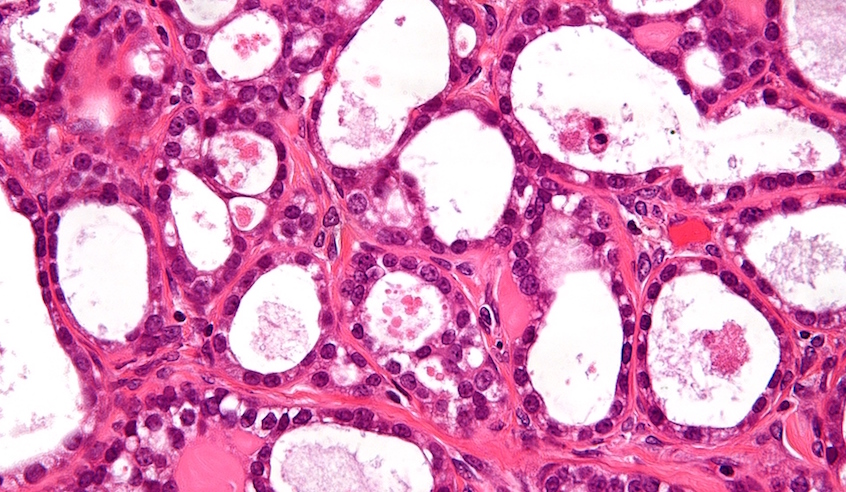
Image: A high magnification image of ovarian clear cell carcinoma. Image credit: Copyright © 2011 Michael Bonert. Licence: CC BY-SA 3.0.
Assessing the cell ‘ecosystems’ at sites where ovarian cancer has spread round the body strongly predicts the chances of surviving from the disease, a new study reports.
A new computerised test using software designed to study plant and animal ecosystems measures diversity among cells in the environment around secondary tumours, or metastases, after cancer’s spread.
Scientists at The Institute of Cancer Research, London, with collaborators in China, found a 'staggering' difference in survival rates between women with high and low levels of diversity at these metastatic sites.
The fully automated test could identify those women who have the most life-threatening disease, and who urgently need the most aggressive treatment.
Survival rates predicted
The test gives a score for metastasis diversity, known as MetDiv, based on whether a patient's sites of cancer spread have one dominant cell type (low score) or a more diverse cell population containing immune or connective tissue cells (high score).
Survival was far poorer among women with high diversity scores than those with low scores. Just 9% of women with diverse metastases survived five years from diagnosis, compared with 42% of those whose metastases were dominated by one cell type.
A high diversity score was a stronger predictor of poor survival than any of the clinical factors currently used to try to assess a woman’s prognosis.
The study was published on Monday 19 September 2016 in the journal Oncotarget and was funded by the ICR, the Wellcome Trust and the National Institute for Health Research Biomedical Research Centre at The Royal Marsden and the ICR.
‘Complex ecosystems’
The researchers analysed 192 secondary tumours that had spread to the area around the ovary, peritoneal cavity, lymph nodes or appendix, from 61 women with more than one metastasis treated at Sun Yat-sen University Cancer Centre in China.
Dr Yinyin Yuan, Team Leader in Computational Pathology at the ICR, said: “We used to think of tumours as simply a collection of cancer cells, but we now know that they are often complex ecosystems made up of different types of healthy cell, too.
“Our study has revealed that diverse cell populations at the sites of cancer spread are a clinically important feature of particularly aggressive ovarian cancers.
"We have developed a new test to assess the diversity of metastatic sites, and use it to predict a woman’s chances of surviving their disease. More work is needed to refine our test and move it into the clinic, but in future it could be used to identify women with especially aggressive ovarian cancers, so they can be treated with the best possible therapies available on the NHS or through clinical trials.”
Professor Paul Workman, Chief Executive of the ICR, said: “Ovarian cancer is more likely to spread than many other cancers because there is no barrier between the ovaries and the peritoneal cavity — the fluid-filled space in our torso that houses the body’s organs. It’s therefore critical that we understand more about the likely progression of disease among cancers that have spread, and get better at tailoring our treatment for individual women.
“Finding ways of treating highly aggressive ovarian cancers is a huge challenge. But by knowing that a woman has an especially lethal form of disease, we can look to explore aggressive combination treatments, and give women choices about the kinds of care they want to receive.”